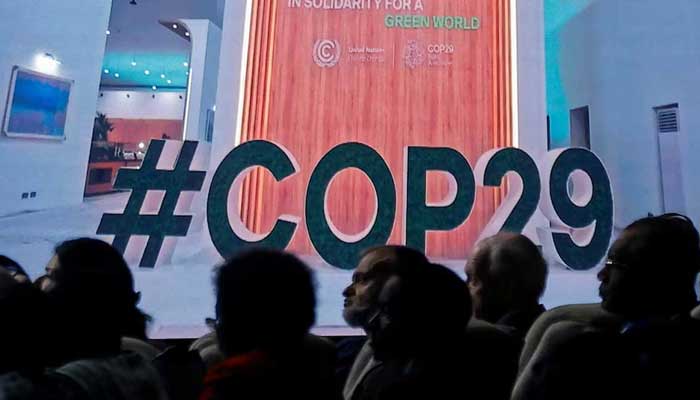An optical illusion
Negotiators at COP29 appeared blinded by short-term interests, seemingly willing to sacrifice nature for transient gains
December 19, 2024

Richard Powers' "The Overstory", a poignant reminder of humanity's intricate connection with nature, seemed almost prophetic during COP29.
Like the characters in the novel, negotiators at COP29 appeared blinded by short-term interests, seemingly willing to sacrifice nature for transient gains.
The concluding phase of the summit particularly resembled the novel's oscillation between hope and despair. For climate-vulnerable states teetering on the edge of catastrophe, the final deal offered little cause for optimism.
Even before negotiations began, developing nations were sceptical about the likelihood of a definitive outcome, with Papua New Guinea boycotting the event entirely, dismissing it as a "total waste of time".
As talks progressed, tensions simmered between the Global North and Global South. The headline figure of $1.3 trillion in the final agreement — rather than being a reparative grant rooted in the principle of historical responsibility — was instead framed as private-sector investments and carbon trading schemes designed to inflate the tally.
The commitment to gradually raise climate finance to $300 billion by 2035, split between grants and loans, was also heralded as a victory by the Global North. However, developing nations dismissed it as grossly inadequate, given that the UN Environment Programme’s Adaptation Gap Report estimates a need for approximately $215 billion annually by 2030.
The fraught atmosphere at COP29 reached a boiling point when representatives from Small Island Developing States (SIDS) and Least Developed Countries (LDCs) staged a dramatic walkout.
Their protest stemmed from the persistent lack of empathy and ambition in addressing demands for stronger financial commitments and equitable climate finance.
Accusations of procedural misconduct and stage-managed proceedings marred the conference, ultimately widening the gulf between developed and developing nations. Environmentalists were particularly irked by the persistent advocacy for carbon markets as a central mechanism for climate finance.
A holdover from the failed Kyoto Protocol, carbon markets have historically been used as a tool for greenwashing rather than genuine climate action.
The disagreements at COP29 were not limited to adaptation but extended to mitigation commitments as well.
The duplicity of developed nations disgusted many participants. Despite acknowledging the UN's principle of Common but Differentiated Responsibilities, these nations avoided making meaningful concessions.
Particularly concerning was the unapologetic presence of more than 1,700 oil and gas lobbyists within the summit halls. As a replay of COP28, their influence was evident in the softened language of many delegations, signalling that robust commitments to phase out fossil fuels would remain conspicuously absent.
Oil-producing nations went as far as attempting to dilute the already toothless language on fossil fuel dependency. Adding insult to injury, the host nation openly advocated for fossil fuel expansion, framing it as a "gift from God".
This glaring conflict of interest underscores the persistent issue of COP summits being hosted by countries whose agendas are at odds with the spirit of the UN Framework Convention on Climate Change.
Perhaps the most disheartening aspect of COP29 was the developed world’s use of the spectre of Donald Trump’s potential return to the White House as leverage.
Instead of treating the summit as a last opportunity to act decisively before a possible climate-sceptic administration takes charge, they cynically argued that failure to secure a deal in Baku would leave the climate agenda vulnerable to complete derailment. While some might view this as pragmatic, it ultimately reflected a moral compromise — prioritising political expediency over planetary urgency.
The shaky outcomes of COP29 do not bode well for Pakistan. The country remains burdened by insufficient financial support, saddled with conditions that deepen dependency, and continuously ravaged by recurring climate crises.
Balancing the dual challenge of managing domestic climate resilience while advocating for justice internationally is an uphill task. Yet, this situation also presents an opportunity for Pakistan to redefine its role in the global climate landscape through strategic diplomacy. Given the complexities of multilateral financing, the country could explore bilateral arrangements as alternative avenues for climate finance.
Such efforts must be underpinned by the effective implementation of domestic environmental and climate policies. Without demonstrable progress at home, Pakistan’s international advocacy risks losing credibility.
COP29 serves as a stark reminder that climate justice remains an elusive goal. The outcomes of the summit echo Powers’ portrayal of humanity’s detachment from nature. Perhaps the most telling indictment of COP29’s failure is that two rival nations – one calling it a "let-down" and the other describing it as an "optical illusion" — found themselves aligned in disappointment.
The writer is a senior researcher at the Centre for Aerospace and Security Studies (CASS), Lahore. He can be reached at: [email protected]
Disclaimer: The viewpoints expressed in this piece are the writer's own and don't necessarily reflect Geo.tv's editorial policy.
Originally published in The News











